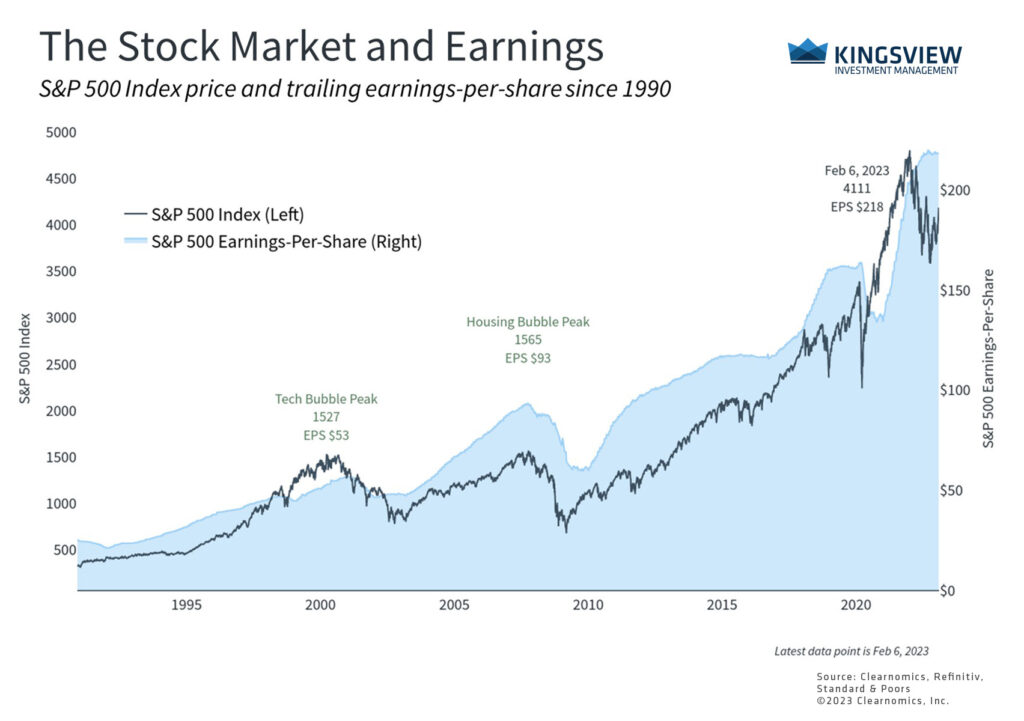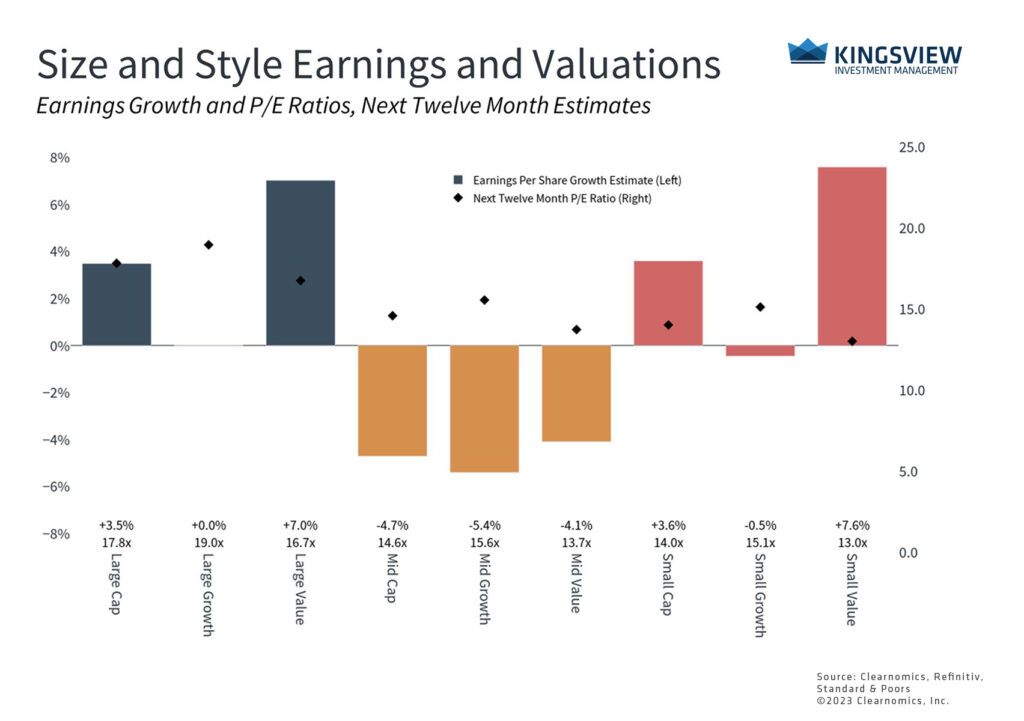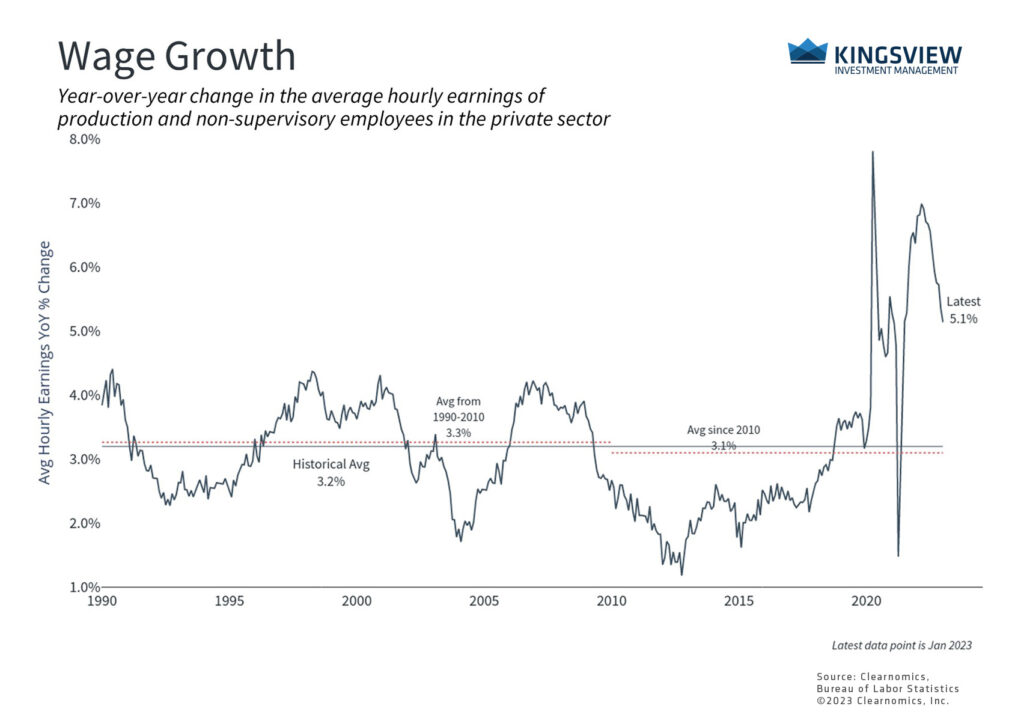Portfolio Manager Insights | How Corporate Earnings Can Guide Long-Term Investors – 2.8.23

While major stock market indices have rallied this year, investors continue to receive mixed signals from the economy. On the one hand, inflation is improving which has allowed interest rates to stabilize at a lower level. On the other hand, last week’s jobs report was a significant surprise to the upside with 517,000 net new jobs created in January and the unemployment rate falling to 3.4%, the lowest in over 50 years. Although the inflation data suggest the Fed could slow or pause its rate hikes, the jobs data mean that they may need to keep their guard up. This uncertainty creates confusion as markets adjust to financial conditions. What should long-term investors focus on to stay invested toward their financial goals?
Stock market investors don’t directly invest in the economy. Instead, they are impacted by economic trends through the revenues and profits of the companies in which they invest. When the economy is growing rapidly and consumers are doing well, company sales tend to improve. When inflation is rising or the job market is competitive, costs may rise. At a macroeconomic level, the job of companies is to balance these opportunities and risks. Over long periods of time, the stock market tends to follow earnings trends, which in turn follow economic cycles.
The stock market follows earnings trends over years and decades

Given the importance of earnings, it’s no surprise how much coverage there is of individual company earnings reports in the news and in the investment industry. However, for long-term investors, the aggregate earnings picture for the S&P 500 matters much more. At the moment, about 50% of S&P 500 companies have reported fourth quarter earnings. This was a quarter during which costs were elevated compared to the year before due to inflation and rising wages, while consumer spending was weakening and there were fears of an upcoming recession.
This led to lowered earnings estimates which has allowed 69% of S&P 500 companies that have reported to beat expectations so far, while 65% have beaten on revenues. Overall, S&P 500 companies are estimated to have grown earnings by 7.4% in 2022, but will only experience 3.5% growth over the next twelve months, before accelerating again in 2024.
Earnings are expected to slow across market categories

Just as many economists expect flat or slightly negative economic growth in 2023 before seeing a recovery in 2024, many expect earnings growth to be meager this year as well. In this way, both sets of data point to a “reset” as the world adjusts to the shocks of the past few years – or as many investors like to refer to it, a “v-shaped recovery.” In this context, there are two facts to keep in mind.
First, corporate earnings are still at record levels for large cap companies with S&P 500 earnings-per-share reaching about $218 on a trailing basis. Analysts are not anticipating negative growth in 2023 – just slower growth. This does differ across market size and style categories, however. Mid caps, for instance, are expected to see earnings decline in 2023 while small caps could see faster growth. However, both of these size categories are much more attractively valued than their large cap counterparts, despite these earnings trends.
Second, if inflation continues to slow, costs may improve and help support profitability across companies of all sizes. After all, rising costs due to higher goods prices and growing wages have crimped earnings over the past year. Similarly, if consumer confidence returns and spending rebounds, this could help prop up earnings.
This is a balancing act since the flip side of consumer spending is wage growth, which represents higher costs for businesses. Wages are still growing 5.1% year-on-year, but this has eased from recent peaks.
Corporate costs could improve as inflation eases

Of course, the specific circumstances differ across individual companies and industries. Thus, it’s also positive that seven of the eleven S&P 500 sectors are expected to experience positive earnings growth over the next year, despite the challenging environment. The exceptions are the commodity-sensitive materials and energy sectors which benefited from rising prices last year, and the real estate sector which has been directly hit by rising rates.
It’s important to keep in mind that analyst forecasts are not always accurate and are subject to change based on economic conditions. Still, expectations for this year align with slower growth trends across the economy. However, they also suggest that earnings could rebound once the underlying fundamentals improve and inflation stabilizes. Either way, record earnings continue to support valuations which are the most attractive in years.
The bottom line? To cut through the noise, investors should continue to focus on fundamentals such as earnings as the Fed and inflation stories play out.
Historical references do not assume that any prior market behavior will be duplicated. Past performance does not indicate future results. This material has been prepared by Kingsview Wealth Management, LLC. It is not, and should not, be regarded as investment advice or as a recommendation regarding any particular security or course of action. Opinions expressed herein are current opinions as of the date appearing in this material only. All investments entail risks. There is no guarantee that investment strategies will achieve the desired results under all market conditions and each investor should evaluate their ability to invest for the long term. Investment advisory services offered through Kingsview Wealth Management, LLC (“KWM”), an SEC Registered Investment Adviser. (2023)


